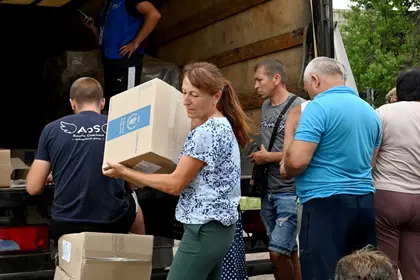One of the main missions of the United Nations is humanitarian assistance in response to disasters, natural, man-made and those caused by war. But, since Russia openly invaded Ukraine, many humanitarian disasters have occurred in the country without the UN responding appropriately, or at all.
One of the most recent and vivid examples is the blowing up of the Kakhovka Hydroelectric Power Plant (HPP). At that time, protests broke out in Ukraine due to the lack of any reaction from the UN.
JOIN US ON TELEGRAM
Follow our coverage of the war on the @Kyivpost_official.
In general, during the period of the full-scale invasion, Ukrainians were already indignant about the work of the organization.
Aug.19 is International Day of UN Humanitarian Aid. So, I decided to talk to people on the streets of Kyiv and with my followers on social networks to find out what they think about the work of the UN. Here are their opinions.
Opinion on the street
“In the humanitarian sense, it’s doing its job. But they have done work in many directions, and in others, you can hear onlyone thing: ‘We are concerned.’ For a year and a half, no decisive actions.” – Ivan Stefyuk.
“Actually, if we limit ourselves to humanitarian issues, most of the accusations were for the past year. They all evacuated Ukraine for a very long time, despite the humanitarian catastrophe. In fact, they returned to work only in May, and then quite weakly. In my opinion, they don’t use all available opportunities to help. But most of the comments to the UN are on other issues. The organization did not curtail or reduce any program in the Russian Federation, despite global sanctions.” – Volodymyr Yavorsky.

Latest on Russia’s Intransigence to End War Against Ukraine
“Everything humanitarian the UN does wouldn’t have to be done if it could fulfill its mission – to prevent wars.”
“I’ve always had the following question: Do European taxpayers believe that their funds for UN administration are being used effectively? That is, OK, the UN (as well as the International Committee of the Red Cross) say that they are limited by the mandate, and if they can’t do something (get prisoners to visit, for example) – then that is normal, they are acting within the framework of what is allowed. But in return, the administration of the organization costs a lot. Someone should show the taxpayers: what they invest – and what these organizations ‘can do’ in return. Is it really worth that much, or – if you can do so little – let’s cut staff and projects? In short, we are talking about a kind of audit.” – Tetyana Yakubovych.
"Their public position is very questionable, where there is no clear positioning that – ‘Russia is an aggressor, violates international agreements and international law!’ The logical question is ‘Why won’t the UN introduce its observer representatives in Enerhodar/Nikopol/Kherson... in order to thereby protect the civilian population from Russian aggression?’ Now the UN takes the position of a teenager who pretends to be an adult, while not fulfilling its direct duties and functions, and does not demand reciprocity from community representatives.” – Kyrylo Cherkashin.
“Everything humanitarian that the UN does wouldn’t have to be done if this organization was able to fulfill its mission – to prevent wars.” – Andriy Kramchenkov
“In my opinion, the UN fulfilled its function and survived, just like the League of Nations once did. They were able to prevent a major war for nearly eighty years, but when faced with a problem that exceeded their capabilities, they showed their ineptitude and incompetence. We will have to change the algorithms and build a more modern structure... if we don’t all die.” – Mykola Soroka.
A humanitarian worker who deals with UN agencies
I also spoke with Mladena Kachurets, a woman who works for the humanitarian networks of various UN agencies.
“It’s unknown how to prevent the continuation of Russia’s aggression,” she said. “How to force them to retreat, how the UN works in Ukraine to spread information to other states, whether work is being done to fix violations of the UN Charter and other documents – it’s unknown.
“There is not a word about it on their pages on social networks. There is no information about help, for example, with a humanitarian corridor for residents of the occupied territories who want to escape to the territory controlled by Ukraine,” Kachurets said.
“The relevant UN agency doesn’t organize such an opportunity for people. People under occupation are left to fend for themselves, and the UN doesn’t show any activity, at least publicly.
“In private, I suspect, too, because people are forced to go through filtering and bullying in order to get out of the occupation through Russia,” she said.
Kachurets also asked: “What about kidnapped children? Where is the work on their return specifically on the part of the UN?”
What does the UN say about such accusations?
The last time I managed to talk with UN representatives was after the Kakhovka tragedy. That day, students gathered at the embassy building in Kyiv demanding the UN respond to the disaster.
In response to the questions, of what is the UN’s official reaction and whether the organization agrees with protesters’ accusations of inaction, the Head of the UN mission in Ukraine, Denise Brown, said that “not everything has been done, it’s obvious right away.” She thanked everyone who was not indifferent and said that the organization is working to make improvements.
“In the future, I will do what I do every day – deliver humanitarian aid to those in need, especially on the front lines,” Brown said at the time.
And to her credit, Brown has indeed been regularly speaking out about Russia’s incessant deadly air attacks on Ukraine’s civilians and infrastructure.
But is she being heard in the UN headquarters in New York?
You can also highlight the text and press Ctrl + Enter










